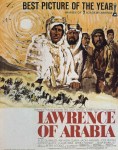Lawrence of Arabia
Directed by David Lean
Written by Robert Bolt and Michael Wilson based on the writings of T.E. Lawrence
1962/UK/USA
Columbia Pictures/Horizon Pictures
Repeat viewing
#404 of 1001 Movies You Must See Before You Die
IMdB users say 8.4/10; I say 9/10
Jackson Bentley: What is it, Major Lawrence, that attracts you personally to the desert?T.E. Lawrence: It’s clean.
Although epics are not my cup of tea, I make a giant exception for Lawrence of Arabia.
This is the dramatized story of T.E. Lawrence, who served in the British army as a liaison with the Arabs during the Sinai and Palestine Campaign and the Arab Revolt against Ottoman Turkish rule of 1916–18.
Lawrence (Peter O’Toole) is an undisciplined and slightly off-kilter officer who is selected by Mr. Dryden (Claude Rains) of the Foreign Office to gather intelligence from Prince Faisal (Alec Guinness) , the leader of a prominent Bedouin tribe, due to his prior travels in the Middle East and knowledge of Arabic. He almost immediately goes native, advising Faisal contrary to the orders and conventional wisdom of his British military superiors. Through his understanding and love of the Arabs, Lawrence wins their trust despite some initial friction with Faisal’s son, Ali (Omar Sharif).
Lawrence devises a daring plan to take the Turkish-held stronghold of Aqaba with a small contingent of Faisal’s men. In the desert, he manages to attract the support of Auda abu Tayi (Anthony Quinn) and his tribe against the Turks. The victory at Aqaba makes Lawrence a hero to the Arabs. Already almost mystically over-confident, Lawrence begins to believe his own P.R. Then, he is forced to execute a man to mediate a dispute between tribes and returns to Cairo to inform the British of the victory. On the way, one of his young servants dies horribly in quicksand. Both these deaths are huge blows to Lawrence.
In Cairo, Lawrence asks to be relieved of his role but General Allenby (Jack Hawkins) will have none of it. Lawrence asks Allenby for assurance that the British have no imperial ambitions in Arabia and Allenby falsely gives them. Lawrence returns to the desert to lead the Arab armies in support of British troops. After a series of successful skirmishes with the Turks, Lawrence is captured in Daara and severely beaten. He manages to disguise his identity so is eventually released. The trauma of this encounter sends him right over the edge and from then on Arab battles with the Turks become increasingly savage.
Eventually, the Arabs manage to take Damascus before the British can and Lawrence helps them set up an Arab Council to rule the city. This results in chaos, however, because the Arabs are ill-equipped to cope with the necessities of modern life such as electricity, water, telephones, etc. The practical Prince Faisal arrives to take charge in cooperation with the British and Lawrence is sent packing. (Faisal goes on to found the Hashemite dynasty, which still reigns in Jordan.)
Lawrence of Arabia has all the splendor of an epic with its magnificent score, gorgeous desert vistas, and thousands of extras marching into battle. It is much more than that because of the complex portrayal of Lawrence by the screenwriters, director, and newcomer Peter O’Toole. Those hypnotic blue eyes perfectly capture the blend of messianic lunacy and steely determination that was Lawrence. The rest of the distinguished British cast also excels. This is genuinely a film that should not be missed.
The film is filled with second choices in the casting of the roles. How lucky we are that Lean settled on the cast we see. Lawrence of Arabia won seven Academy Awards: Best Picture, Best Director, Best Color Cinematography (Freddie Young), Best Color Art Direction, Best Sound, Best Film Editing and Best Score (Maurice Jarre). It was nominated for an additional three Oscars: Best Actor (O’Toole), Best Supporting Actor (Sharif) and Best Adapted Screenplay.
http://www.youtube.com/watch?v=RQA_ldX0VI0
Trailer







11 responses to “Lawrence of Arabia (1962)”